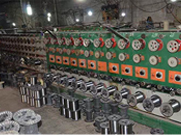gru . 21, 2024 14:11 Back to list
CE Certification for Filter Components and Their Application Standards
Understanding CE Certification and the Importance of Filter Pieces in Compliance
The CE marking, which stands for Conformité Européenne, is a certification mark that indicates a product’s compliance with European health, safety, and environmental protection standards. This certification is essential for manufacturers wishing to market their products within the European Economic Area (EEA). Among various products that require CE certification, filter pieces play a critical role, particularly in sectors such as environmental management, manufacturing, and healthcare.
Filter pieces refer to components used in various devices and systems designed to remove contaminants from air, liquids, or other substances. Common examples include air filters, water filters, and industrial filtration systems. These components are vital for ensuring the safety and reliability of products and systems, particularly those that directly affect human health and the environment.
Why CE Certification Matters for Filter Pieces
1. Quality Assurance Achieving CE certification signifies that a filter piece has been rigorously tested and meets EU standards. This assures customers and stakeholders that the product is of high quality and performs its intended function effectively. For example, in healthcare applications, a certified air filter may minimize the risk of airborne infections, hence safeguarding patients and healthcare workers alike.
2. Market Access Without CE certification, manufacturers cannot legally sell their filter pieces in the EEA. This restriction can limit market opportunities significantly. Hence, obtaining this certification is not just a regulatory requirement but a key marketing tool that helps businesses expand their reach in competitive markets.
3. Environmental Compliance Many filter pieces are used in applications aimed at reducing pollution and protecting environmental ecosystems. CE certification ensures that these products adhere to environmental regulations, promoting sustainable practices. For instance, water filters that remove harmful substances can help organizations comply with EU directives on water quality, which is crucial for safeguarding public health.
4. Consumer Confidence In an era of increased consumer awareness regarding product safety and environmental impact, CE certification enhances trust. When customers see the CE mark, they are more likely to purchase products, knowing that they adhere to strict regulations and have undergone necessary conformity assessments.
The CE Certification Process for Filter Pieces
ce certification filter pieces

The path to CE certification typically involves several key steps
1. Determine Applicable Directives Identifying which EU directives and regulations apply to your filter pieces is the first step. This can vary based on the filter’s intended use and specific sector regulations (e.g., medical devices, machinery, or environmental protection).
2. Conduct Risk Assessment Manufacturers need to perform a risk assessment to identify potential hazards associated with their filter pieces. This involves evaluating the materials used and the functioning of the filter in its intended environment.
3. Compliance Testing Products must undergo testing to ensure they meet established EU standards. This may involve laboratory tests, performance evaluations, and possibly third-party testing by a notified body, depending on the product category.
4. Technical Documentation Manufacturers must compile technical documentation that demonstrates compliance with applicable standards, including design specifications, risk assessments, and test results.
5. Declaration of Conformity Once all requirements are met, the manufacturer must draft and sign a Declaration of Conformity, which asserts that the product complies with all relevant EU laws.
6. Affix the CE Mark After successful completion of the above steps, the CE mark can be affixed to the product, allowing it to be marketed within the EEA.
Conclusion
CE certification for filter pieces is not just a bureaucratic requirement; it plays an integral role in ensuring product safety, enhancing consumer trust, and promoting environmental sustainability. With the increasing complexity of regulations and the rising demand for quality assurance in the global market, manufacturers must prioritize obtaining CE certification for their filter components. This proactive approach not only guarantees compliance but also positions businesses favorably in a competitive landscape, ultimately benefiting both manufacturers and consumers alike. As industries continue to evolve, the importance of CE certification and its impact on product development and market access cannot be overstated.
share
-
Competitive Screen Mesh Price | 1/4", 1/8", 1/2" Wire Mesh Screens
NewsAug.17,2025
-
CE Certified 250 Micron SS Mesh: Precision & Durability
NewsAug.15,2025
-
CE Certified 250 Micron Stainless Steel Mesh - Durable & Precise
NewsAug.14,2025
-
Precision CE Certified 250 Micron Stainless Steel Mesh
NewsAug.13,2025
-
CE Certified Metal Fine Mesh & Screen Fabric | Top Quality
NewsAug.12,2025
-
Premium CE Certified 250 Micron Stainless Steel Mesh
NewsAug.11,2025

